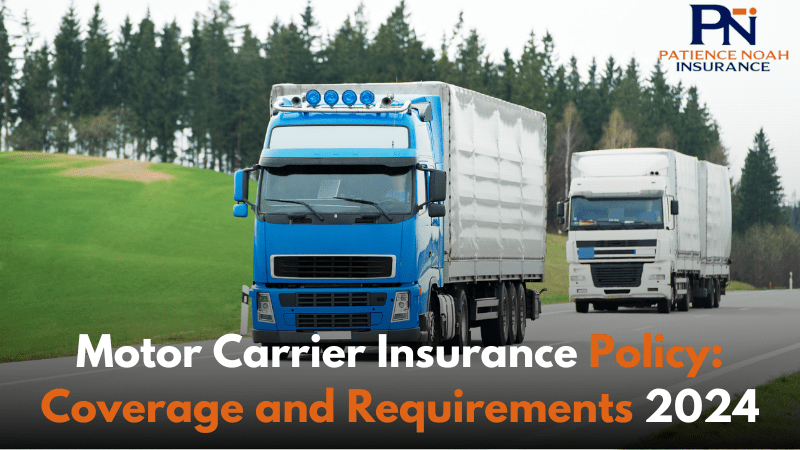Among multiple insurance policies, one of the most important is the “Motor Carrier Insurance Policy.” It has much to do with business owners whose livelihood depends solely on their Business. It was introduced in 1993 by the Insurance Services Office. In this blog post, we will cover vehicle carrier coverage in detail. That will help you choose the right insurance for your business.
What is a Motor Carrier?
Motor Carrier is a business that provides transportation services for passengers, products, and properties. These carries contain vehicles like buses, trucks, and tractor-trailers.
What is Motor Carrier Insurance?
It protects all vehicles transporting goods, passengers, and people’s possessions. It covers primary liability, cargo, and physical damages to vehicles in case of accidents.
Motor Carrier Operations in the Transportation Industry
1. Freight Transportation
Freight transportation specializes in individuals and businesses transporting goods and commodities. It also includes industrial equipment and raw materials.
2. Trucking Companies
Trucking companies are common carriers that deal with products and properties with the help of trucks and tractor-trailers. These companies do operations locally and nationally according to the requirements of clients.
3. Logistic Companies
Logistic companies manage business logistic solutions, including warehousing, distribution, and services management. The carriers play a vital role in delivering goods between various points in the supply chain.
4. Passenger Transportation
It also covers carriers transporting passengers in different industries via buses, coaches, shuttles, etc. They offer scheduled route services, commuter services, and special event transportation.
What Does This Insurance Cover?
This insurance includes several components in its coverage. Here are some areas that are covered by carrier policy in common in almost all regions:
Body Injuries
It will pay for bodily injuries and property damage caused by accidents involving insured commercial vehicles. You must have liability insurance to apply for carrier coverage.
Cargo Coverage
It protects cargo and pays for the loss or damage of goods or products. It also covers carries from financial losses due to stealing and destroying cargo during transportation.
Physical Damage
This insurance plan protects vehicles in repairing and replacing their car in case of robbery, collision, fire, etc. The main benefit of it is that it protects your investment in commercial vehicles.
Non-Trucking Liability
Non-trucking means that you get in an accident when you are not engaged in any business-related activities and are not at fault. The primary purpose of this is to cover those areas that do not fall under liability insurance.
Workers Compensation
If an injured or disabled carrier is injured at work, workers’ compensation pays for medical bills, lost wages, and other benefits.
Trailer Interchange Coverage
Sometimes, the carriers use trailers that do not come under their ownership but are insured and use trailers under a trailer interchange agreement. It will protect trailers owned by others.
Motor Carrier Insurance Requirements
Here are the leading insurance requirements for different vehicles. Other requirements vary state by state.
1. General Freight
The minimum insurance requirement for vehicles with a gross vehicle weight rating of 10,001 pounds or more is $750,000.
2. Hazardous Material
Hazardous materials have special requirements. If your vehicle has a gross weight rating of 10,001 pounds or more and you are using it to transport dangerous material, then the minimum insurance requirement is $5,000,000.
3. Passenger Carriers
Vehicles with 16 or more passengers, including the driver, such as buses, coaches, and shuttles. The requirement for a vehicle with a GVWR of 10,001 pounds is $5,000,000; for a car with a GVWR of 10,000 pounds or less, it is $1,500,000.
How Do You File for This Insurance Policy?
You must find an insurance company nearby to help you apply for carrier coverage. When you receive a docket number, you should always contact your agent or company to complete the required forms.
To confirm the applicant’s registration, FMCSA must receive these forms within 90 days of releasing the public notice of attention.
Wrap Up
A carrier insurance policy is necessary for businesses, whether they operate on a small or large scale. In businesses where vehicles play a vital role, they always come with a high loss risk.
This insurance should be done immediately to protect your investment from uncertain losses. If you have questions about this policy, let us know in the comments section.















